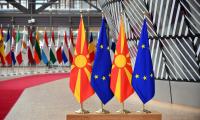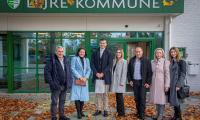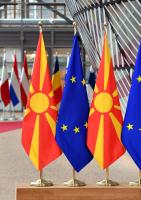North Macedonia
North Macedonia is strengthening its democracy, while working towards closer ties to the European Union
After its independence from Yugoslavia North Macedonia transitioned into a presidential republic, holding elections for parliament and the presidency every fifth year. The first decade of independence was marked by ethnic tensions between Macedonians and the Albanian minority. In 2001 a peace agreement was negotiated in the nascent democracy, with support from the EU and NATO. Since 2005 North Macedonia has been a candidate country for the EU, but the path to membership has been difficult and drawn out. 2019 became a milestone for the country’s progression towards EU, as it, in agreement with Greece, changed its official name from the Republic Macedonia to the Republic of North Macedonia, which allowed for further negotiations about participation in the EU. In 2020 North Macedonia entered NATO as the 30th member country.
The North Macedonian election in 2019 was won by Stevo Pendarovski from the center-left party, Socijaldemokratski sojuz na Makedonija (Social Democratic Union of North Macedonia). The election was dominated by the issue of the name change, but candidates from the major parties all supported EU-candidacy and the ascension to NATO.
Early parliamentary elections were held in July 2020 against the backdrop of the European Council failing to agree on starting talks with North Macedonia on joining the European Union. The election resulted in a hung parliament, with no party gaining a majority of the seats. SDSM and BDI, the largest Albanian ethnic party, entered a coalition government after a month-long negotiation period.
Population: 1.836.713.
Liberal Democracy Index: 0,36.*
[LDI encaptures both electoral and liberal aspects of democracy]
Proportions of Seats held by Women in Parlament: 41,7%**
Proportions of Seats held by Youth under 30 in Parlament: 5%**
*V-Dem Institute
**IPU.org






